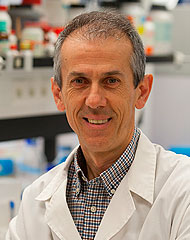"Vaccination is an act of solidarity: as long as there is a population that is not protected, there will be a niche where the virus can infect".
Pablo Sarobe, researcher of Cima University of Navarra, is optimistic about the announcements of Pfizer, Moderna and Janssen: "They have passed the same requirements safety and efficacy tests as other vaccines".

The researcher of the Cima University of Navarra Pablo Sarobe was sample optimistic about the announcements of effectiveness of the Pfizer, Moderna and Janssen vaccines. "These are innovative vaccines, with similar technology. According to the published data , which we should soon see confirmed in scientific journals, they have good immunological activity", he points out. The scientist took part in a lecture on "COVID19 vaccines: present and future", as part of the Science Week activities organized by the Science Museum of the University of Navarra.
Regarding the reluctance of part of the population to administer them, he assures that "vaccination is an act of solidarity and, ideally, there should be a general awareness of its necessity and of the benefits it brings to society as a whole". As opposed to the case of traditional drugs, where the main person affected is the one who receives the treatment, "in vaccination the benefit is global", the expert points out. In fact," he says, "there are people who would like to be vaccinated, but due to factors such as age or other concomitant diseases, this measure is not as effective, and the best way to protect them is to protect society as a whole".
The researcher of the Immunology and Immunotherapy Program at Cima adds: "In the spring, everyone was very proud of the solidarity involved in staying at home for the good of all. Well, vaccination would be the same from now on."
Faced with the statement by Ugur Sahin, creator of the Pfizer vaccine, about the possible recovery of a "normal life" in mid-2021, he confirms that if the vaccine efficacy and vaccination rate are high enough to reach the immunity of group, we would be protected. "But as long as there is a percentage of the population that is not protected by the vaccine, there will always be a niche where the virus can infect and spread," he stresses.
Side effects similar to those of other vaccinesWhen asked if he would be vaccinated, the scientist does not hesitate: "I have no reason to be reluctant to take a vaccine that has been approved after passing the different phases and with the data of efficacy that is being made public". In his opinion, people's mistrust could be due to the lack of knowledge on the approval processes: "Although it has been released in such a short time, the vaccine has passed the same safety and efficacy requirements as any other, and has been approved by the corresponding committees".
This approval means that it has demonstrated certain levels of safety and that the side effects generated in the thousands of people who have participated in the previous clinical trials are within acceptable limits, the expert explains. So far, the side effects reported in the Pfizer, Moderna and Janssen trials are in line with what is usually observed in other vaccines. "They are signs such as redness and inflammation at the injection site, a more or less mild fever, etc., which in most cases are very short-lived.
He also stresses that these vaccines may be the first, but they will not be the only ones, since there are others that have also shown promising results: "From the point of view of efficacy, they do not necessarily have to be the best, and there are also practical issues, such as product stability and storage and distribution requirements , that could make some vaccines more suitable than others," he says.
In fact, at the University of Navarra, Pablo Sarobe's team is doing research on one of them. "Our vaccine is based on the administration of fragments of very specific areas of the virus, which requires the identification of those areas and what immune properties they have. This makes the process slower than vaccines based on whole viruses or proteins." So far they have identified some of those areas and are characterizing the effect of administration in animal models. "Having achieved this goal the idea is to design a vaccine with the best efficacy and safety properties," he concludes.





